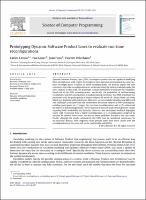Por favor, use este identificador para citar o enlazar este ítem:
https://repositorio.usj.es/handle/123456789/656
Registro completo de metadatos
| Campo DC | Valor | Lengua/Idioma |
|---|---|---|
| dc.contributor.author | Cetina, Carlos | - |
| dc.contributor.author | Giner, Pau | - |
| dc.contributor.author | Fons, Joan | - |
| dc.contributor.author | Pelechano, Vicente | - |
| dc.date.accessioned | 2021-11-03T15:58:37Z | - |
| dc.date.available | 2021-11-03T15:58:37Z | - |
| dc.date.issued | 2012 | - |
| dc.identifier.issn | 0167-6423 | es_ES |
| dc.identifier.uri | https://repositorio.usj.es/handle/123456789/656 | - |
| dc.description.abstract | Dynamic Software Product Lines (DSPL) encompass systems that are capable of modifying their own behavior with respect to changes in their operating environment by using run-time reconfigurations. A failure in these reconfigurations can directly impact the user experience since the reconfigurations are performed when the system is already under the users control. In this work, we prototype a Smart Hotel DSPL to evaluate the reliability-based risk of the DSPL reconfigurations; specifically, the probability of malfunctioning (Availability) and the consequences of malfunctioning (Severity). This DSPL prototype was performed with the participation of human subjects by means of a Smart Hotel case study which was deployed with real devices. Moreover, we successfully identified and addressed two challenges associated with the involvement of human subjects in DSPL prototyping: enabling participants to (1) trigger the run-time reconfigurations and to (2) understand the effects of the reconfigurations. The evaluation of the case study reveals positive results regarding both Availability and Severity. However, the participant feedback highlights issues with recovering from a failed reconfiguration or a reconfiguration triggered by mistake. To address these issues, we discuss some guidelines learned in the case study. Finally, although the results achieved by the DSPL may be considered satisfactory for its particular domain, DSPL engineers must provide users with more control over the reconfigurations or the users will not be comfortable with DSPLs. | es_ES |
| dc.format.extent | 15 | es_ES |
| dc.format.mimetype | application/pdf | es_ES |
| dc.language.iso | eng | es_ES |
| dc.publisher | ELSEVIER | es_ES |
| dc.relation | We are grateful to the participants of this case study. We also thank both Esteban Saiz and David Unio who helped in preparing the Smart Hotel Case Study. This work has been developed with the support of MICINN under the project EVERYWARE TIN2010-18011. | es_ES |
| dc.relation.requires | Adobe | es_ES |
| dc.subject | Dynamic Software Product Line | es_ES |
| dc.subject | Variability modeling | es_ES |
| dc.subject | Smart Hotel | es_ES |
| dc.title | Prototyping Dynamic Software Product Lines to evaluate run-time reconfigurations | es_ES |
| dc.type | journal article | es_ES |
| dc.relation.publisherversion | https://www.webofscience.com/wos/alldb/full-record/WOS:000325664500008 | es_ES |
| dc.identifier.publicationfirstpage | 2399 | es_ES |
| dc.identifier.publicationlastpage | 2413 | es_ES |
| dc.identifier.doi | 10.1016/j.scico.2012.06.007 | es_ES |
| dc.rights.accessRights | open access | es_ES |
| Aparece en las colecciones: | Artículos de revistas | |
Ficheros en este ítem:
| Fichero | Descripción | Tamaño | Formato | |
|---|---|---|---|---|
| Prototyping Dynamic Software Product Lines to evaluate run-time reconfigurations.pdf | 1,9 MB | Adobe PDF |  Visualizar/Abrir |
Los ítems de USJ están protegidos por copyright, con todos los derechos reservados, a menos que se indique lo contrario.
